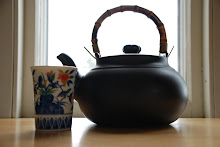
At this time of the year, I am struck by the stark beauty of the bare boughs of trees. The recent snowfall which had laced the tree limbs with powdery whiteness left not a trace of its recent presence. So it was only natural that when asked by our waiter, at a vegetarian restaurant that we like, if I wanted to try the "house twig tea", I said yes without hesitation. This tea turned out to be kukicha, a Japanese tea made in early spring from the leaves as well as twigs of sencha tea production.

My tea brewed a darkish brown color and tasted a lot like its roasted counterpart, the hojicha tea- earthy and faintly cacao-tinged but without the toastiness so prominent in the hojicha itself.

I took small sips of the tea while relishing my dinner of a Southwestern salad heartily tossed with tasty smoked-flavored tempeh, the latter's smokiness making up for the kukicha's lack of this quality. I also welcomed the tea's low caffeine content after having had cup after cup of the stronger oolong earlier that day.
After dinner, we walked outside into an avenue of trees, their branches outlined by the moon against a dusky light. The branches of each tree seemed to be curtsying towards their neighbors'. Filigrees of twigs provided an interlacing canopy over our heads as we ambled along, feeling protected underneath this natural awning.
The spare beauty of this vernal night invoked for me a poem by the Chinese poet, Tu Fu, who lived in the 9th century:
The days grow long, the mountains
Beautiful. The south wind blows
Over blossoming meadows.
Newly arrived swallows dart
Over the streaming marshes.
Ducks in pairs drowse on the warm sand.





No comments:
Post a Comment